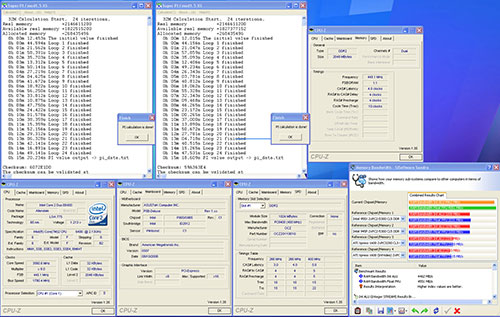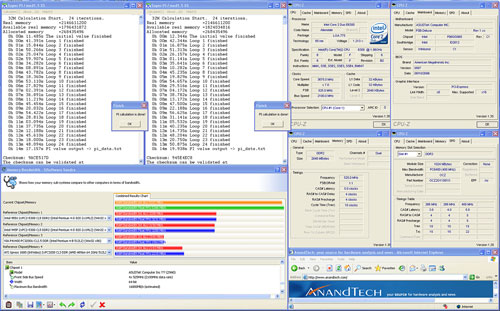ASUS P5B: New BIOS Adds Unlocking & Improved Overclocking
by Wesley Fink on August 24, 2006 3:00 PM EST- Posted in
- Motherboards
As more experience has been gained in overclocking Core 2 Duo chips, it is becoming clear that the 4MB cache E6700 and E6600 do not overclock quite as well as the 2MB Cache chips. There is not a huge difference in the overclocking of 2MB and 4MB at each multiplier, but there is a small advantage to the 2MB design for overclocking. Keep in mind, however, that 2MB performance is lower, so that tends to offset any advantage the 2MB E6400 and E6300 designs might enjoy.
E6400
The E6400 starts at 8x266 or 2.13GHz. With the new 507 BIOS we managed to reach stable speeds of 445x8, 511x7, and 514x6. This composite should give you a better idea of performance at a FSB of 445x8. There is a huge amount of capture information in this image, so you will need to click to enlarge it to readable size.
The jump from 2.13GHz to 3.58GHz is an amazing overclock of 1449MHz, or almost 1500 MHz. Percentage wise, this is a bit more than 68%. With the new ASUS BIOS, we now have the ability to do similar overclocks with the bus speed. With the 6400 the bus speed can now be adjusted from 266 to 514, which represent s a potential bus speed overclock of 93% - almost double the stock 266 FSB speed.
E6300
At $183 the E6300 represents the best value among the Core 2 Duo processors. The 65nm architecture combined with a low starting speed of 1.83GHz presents buyers with some amazing overclocking potential. These capabilities are enhanced further with the ASUS 0507 BIOS.
The E6300 unlocked down and reached 525x7 at stock multiplier. We were very near the limits of the ASUS P5B with the new BIOS and Scythe Infinity air cooling since dropping to x6 only gained us a few more MHz on the FSB, namely 532 at 6X. This is a100% bus overclock and it clearly demonstrates the added flexibility of the lower speed Core 2 Duo chips.
While the 2MB cache E6400 and E6300 reached higher bus speeds and CPU clocks than the 4MB E6700 and E6600, keep in perspective that the 4MB versions perform faster clock for clock. Any advantage the 2MB might have in our testing is small and is more than offset by the 4MB performance advantage. Still, the 2MB models are definitely impressive overclockers and they are both excellent values in the Core 2 Duo line-up.
E6400
The E6400 starts at 8x266 or 2.13GHz. With the new 507 BIOS we managed to reach stable speeds of 445x8, 511x7, and 514x6. This composite should give you a better idea of performance at a FSB of 445x8. There is a huge amount of capture information in this image, so you will need to click to enlarge it to readable size.
 |
| Click to enlarge |
The jump from 2.13GHz to 3.58GHz is an amazing overclock of 1449MHz, or almost 1500 MHz. Percentage wise, this is a bit more than 68%. With the new ASUS BIOS, we now have the ability to do similar overclocks with the bus speed. With the 6400 the bus speed can now be adjusted from 266 to 514, which represent s a potential bus speed overclock of 93% - almost double the stock 266 FSB speed.
E6300
At $183 the E6300 represents the best value among the Core 2 Duo processors. The 65nm architecture combined with a low starting speed of 1.83GHz presents buyers with some amazing overclocking potential. These capabilities are enhanced further with the ASUS 0507 BIOS.
 |
| Click to enlarge |
The E6300 unlocked down and reached 525x7 at stock multiplier. We were very near the limits of the ASUS P5B with the new BIOS and Scythe Infinity air cooling since dropping to x6 only gained us a few more MHz on the FSB, namely 532 at 6X. This is a100% bus overclock and it clearly demonstrates the added flexibility of the lower speed Core 2 Duo chips.
While the 2MB cache E6400 and E6300 reached higher bus speeds and CPU clocks than the 4MB E6700 and E6600, keep in perspective that the 4MB versions perform faster clock for clock. Any advantage the 2MB might have in our testing is small and is more than offset by the 4MB performance advantage. Still, the 2MB models are definitely impressive overclockers and they are both excellent values in the Core 2 Duo line-up.










84 Comments
View All Comments
mongo lloyd - Friday, August 25, 2006 - link
Thanks, it's good to know that you'll consider such an article. The buyer guide article was good for the time yes. My reasoning is that it kind of defeats the purpose to buy the cheapest Core 2 Duo when you have to buy the most expensive memory to fully utilize it. Makes sense, I hope.Wesley Fink - Thursday, August 24, 2006 - link
I suppose I could be glib and comment that Asus and Gigabyte will soon be the same company so our original reporting is correct. But I won't do that :) Several weeks ago it was announced that the two companies would merge, but brand identities will likely remain distinct - at least for a while.Gary and I did have a discussion about the Gigabyte board this afternoon, but there was a misunderstading between us about the unlock feature on the Gigabyte. Gary has explained this in detail in comments above, and he revised the article to reflect that the Gigabyte board also unlocks down, since not mentioning the Gigabyte was clearly an unintentional error that is now corrected. That will teach Gary to set me up :) Actually, Gary and I have been friends for years - long before I was with AT or Gary came on board with us. Gary is incredibly conscientious, and we are fortunate to have him on staff.
I just got off the phone with Asus Engineering (it's Friday morning in Taiwan) who will provide more information on the chips they claim work on the up unlock and more information on how it works. ALL of the chips we tested unlocked down. None of the chips at AT - "Cherry-Picked", retail, E6700, E6600, E6400, E6300 would unlock and clock up - as we reported CLEARLY. We will update the article with the additional info from Asus when we get it.
As for nothing new, I certainly consider the overclcoks we got pretty exciting. Gary owns the highest overclocks at 525 and 532 on several Forums since he unlocked the P5B. It is now clear the Gigabyte has the unlock down feature also, but I know for a fact the record overclocks didn't happen on the Gigabyte.
xsilver - Thursday, August 24, 2006 - link
asus and gigabyte merge?this is news to me.. link?
this would cause some serious monopolization of the market, which cant be a good thing?
Wesley Fink - Thursday, August 24, 2006 - link
The news is on the Gigabyte website at http://www.gigabyte.com.tw/News/Company/News_List....">http://www.gigabyte.com.tw/News/Company/News_List..... You find the Asus news on the Asus site at http://www.asus.com/news_show.aspx?id=3900">http://www.asus.com/news_show.aspx?id=3900.The "merger" was announced a few weeks ago in the Taiwan technical trade press.
xsilver - Friday, August 25, 2006 - link
oh, not exactly a "merger"more like a partnership
they will be producing a new set of boards together ala asrock type boards?
any news if this partnership will be producing budget boards or enthusiast type boards, the press release doesnt mention that.
has a name been decided yet?
giga-sus ? lol
as-byte? double lol
I suspect this will be more a asrock type venture, where cheap mass produced boards can be made without affecting the parent brand name if questions of quality arise
the benefits though as with asrock, have been the company being able to be more adventurous on designs and configurations?
JaredExtreme - Thursday, August 24, 2006 - link
When I first saw the title of this article I was extremely excited.I was thinking to myself: "Asus adds unlocking? Awesome! I'll finally be able unlock those multipliers upwards on some cheap Conroes!" I have a feeling a lot of other people had the same initial enthusiasm when they saw the title.Of course then I got to the point where it's mentioned that none of the Conroes unlocked upwards. Given that the technology mentioned in this article has existed for some time, I'm not sure why the article was even put on Anandtech.
AdamK47 3DS - Thursday, August 24, 2006 - link
I believe Anandtech needs to edit the article to aknowledge that Gigabyte was the first with the feature.Madellga - Thursday, August 24, 2006 - link
Wesley, you probably know this (at least Gary should know it, as he has threads on the CPU Forum).This is not an ASUS feature - at least on the P965 boards. Gigabyte was there before.
I have a DQ6 and the shipping BIOS F2 had it already.
With so many people on the forum using Gigabyte (including Gary), I wonder why do we have an article based on the Asus.....
ZachSaw - Thursday, August 24, 2006 - link
Exactly. The whole article has been singing in ASUS tune when in fact they've just copied someone else's feature! Shame shame.It's such an old feature to exploit EIST for multiplier adjustment that Gigabyte didn't even talked about it any more. Perhaps Wesley is excited ASUS has finally implemented that feature? :) ASUS fan-boy.
Gary Key - Thursday, August 24, 2006 - link
This is my fault. I had a miscommunication with Wes about the unlock features on the Gigabyte boards. Asus had figured out a way to go up and down which (we are trying to find the proper lot number to test) Gigabyte and others had not at this time. In my conversations with Wes I relayed the wrong statement about Gigabyte's capability in this area or my words were confusing about the EIST exploit. Asus will also implement this capability on the 975X chipset in the near future. If the tables were turned on the manufacturer then Wes would be a Gigabyte Fan-Boy I guess......